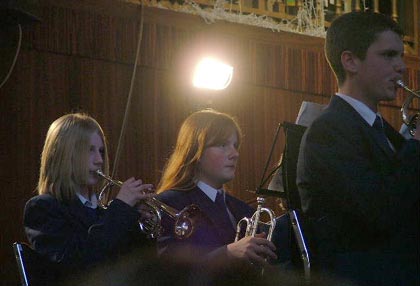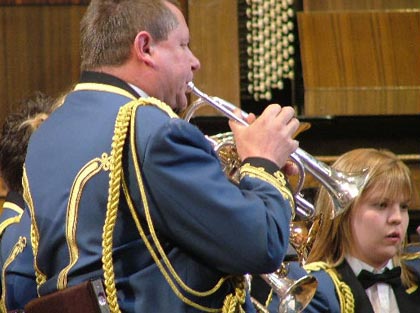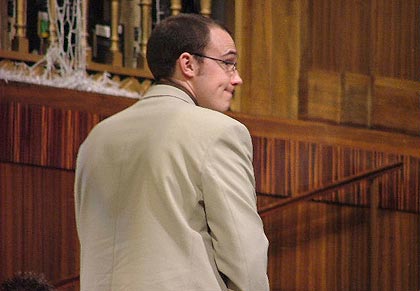2006 Welsh Regional Championships - Postcard from Swansea
23-Mar-2006Swansea may well be the most formal of all the regional venues, but it has an idiosyncratic charm all of its own - especially when it comes to life and death.
The Brangwyn Hall in Swansea is perhaps the most formal of all the Regional contest settings. The Guild Hall (the Brangwyn Hall is part of a larger complex) was built in the early 1930's and completed in functional modernist style in 1934 as a symbol not only of the town itself, but a practical monument to Keynesian economics – it was built with public money in the recession to help get people back to work.

Let there by light - Goodwick Band make music in the dark
Inside it is rather austere, yet the hall itself has one of the great glories of mid 20th century British art on its walls in the form of the huge exotic panels by Sir Frank Brangwyn, which were originally going to be hung in the House of Lords. Because of their rather ‘risque' and colourful content however (there are more bosoms on display than be found in a well thumbed copy of Reader's Wives) the crusty old codgers declined and after a time they found their permanent home in the hall – which of course then took its name.
It is a fine venue to listen to music (William Relton rates it as one of the best in the UK), but only really when it is close to its 1110 seat capacity. If it isn't, and because of the hard surfaces and its lack of the acoustic help that is now part and parcel of the most modern concert halls, it can sound very lively and robs bands of the chance to exploit the detail in the music they play.
Still, it is comfortable, the amenities are very good (although the bar is a bit close to the hall and you can hear the shouts and groans from the drinkers as they watch Wales battle it out on television in the rugby) and it allows the bands and the audience to enjoy the premier Welsh contest in a venue befitting its importance to the movement.

Is that an octopus on your shoulder mate or what?
This year the whole weekend was splendidly run by the Welsh Regional Committee who had to overcome the rather strange occurrence of the stage lights going out before the beginning of the Fourth Section contest. Luckily Phil Morris and his team managed to locate a ‘sparky' who trussed up some temporary arc lighting to ensure the contest could go on whilst he located the fuse box and fixed matters.
There was a real threat of a Stygian gloom enveloping the stage, and at one point with just the arc lights on the band, it did start to look like the Cross Keys Band were going to have a mass séance. Only Doris Stokes was missing. Thankfully our sparky managed to sort it out, but not before the Fourth Section bands played with the additional light (and heat) from the lamps above their heads.
The Fourth Section also gave us the usual treats that make the Welsh contest such an idiosyncratic joy. The first and best concerned the story of one Mrs Valmai Davies, aged 66 who was making her debut at a brass band contest with the Llwydcoed Band.

Thanks Mam: Paul Jenkins displays a very elegant sense of style
In her day job Valmai plays the organ at the local crematorium as a musical backing for the funeral services. At one such service the MD of the Llwydcoed Band just happened to be paying his respects to the deceased when he noticed Valmai playing away rather splendidly. Ever the optimist and knowing Valmai well, he asked her whether she would like to play for the band at the Regional Contest.
Valmai consulted here son, Richard who plays repiano for the BAYV Band and so on the weekend, aged 66 and having never even played in a band before, she made her debut on tuned percussion. The result: A win.
Valmai was of course nervous and a bit apprehensive, but in true black valley's humour she told 4BR: "I really enjoyed it in the end, although I did find it strange that it was the first time in my musical career that I had to play to impress the man in the box."
Great that eh? As was the rather surreal admonishment from the compere to the audience concerning mobile phones. Referring to the notices on the doors of the hall asking people to ensure their phones were switched off, he sternly retorted: "There is a verbal warning on the walls and this is the oral one. Please switch off your phones." Only the Welsh can get away with stuff like this.
The Fourth Section also gave us the sight of two of the MDs taking to the stage in uniforms (rather like the scene in Brassed Off with Pete Postlethwaite), although one was not the same colour as his bands, whilst in the Second Section there was the splendid sight of young Mr Paul Jenkins of the Pontardulais Band in a very elegant fawn suit and matching shoes that perhaps his mam picked from Burton's for him on the Friday before the contest to wear on stage. He looked very natty indeed, but a bit out of place. He conducting was very good though.
Not so the uniforms of the RAF St Athan Band which were bedecked in enough gold braid to sink a battleship. They looked as if someone spilt spaghetti down their sleeves or had a day-glo octopus living on their shoulders. They were fantastic and made a lion tamer's jacket look positively moribund in comparison.
It all made for a great atmosphere on the weekend in Swansea. There was a fine turn out of bands, the contest was well run and finished in time for most people to go and enjoy a quiet pint either at the infamous Bay View Hotel and there was that added pleasure of knowing that for one lady, the thought of trying to impress the man in the box will never be the same again.
Iwan Fox.















